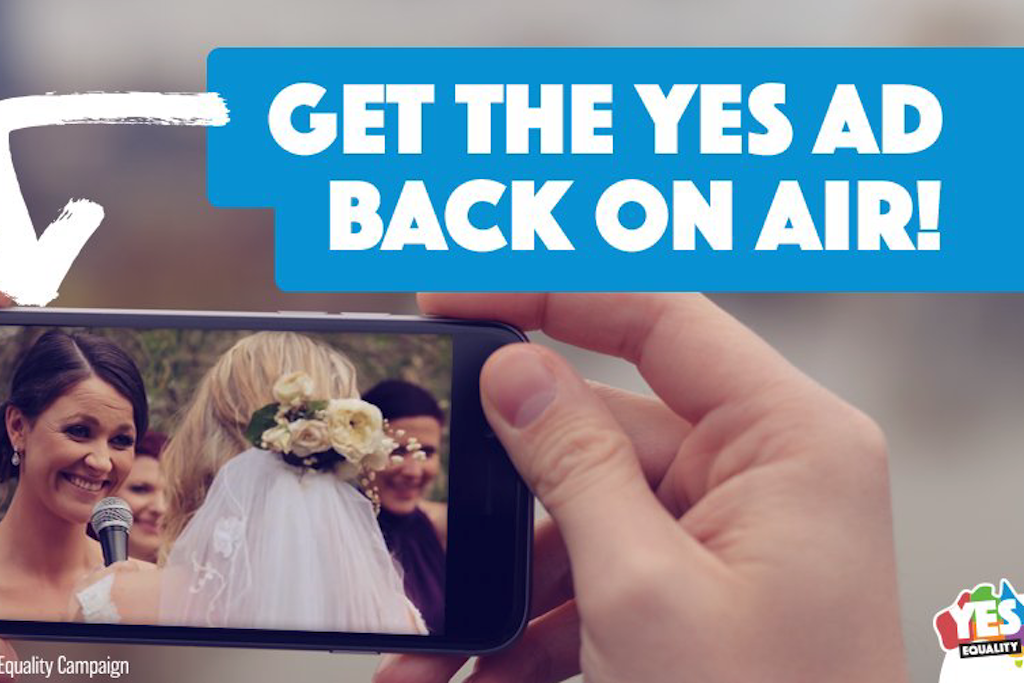The “No” Campaign Is Gaining Ground, It’s Time To Change Tactics
The game has changed.

This piece is written by Robin Banks, the former Tasmanian Anti-Discrimination Commissioner, and Rodney Croome, a long-time marriage equality advocate. Together they argue that the Yes campaign needs to shift tactics.
The two of us are alarmed by the increasing number of people we encounter who previously supported marriage equality, but who now say they are voting No, or just not voting.
The almost universal reason they give is that the No case’s talking points about freedom, school curricula, and to a lesser extent who should raise children, have struck home.
The No Campaign Is Very Good At Distraction
We know how skilled opponents of marriage equality are at muddying the waters, and pipping marriage equality at the post.
We’ve saw it in 2012 when a state same-sex marriage bill we worked hard to gather support for was defeated by just one vote in the Tasmanian Upper House after a last minute campaign to confuse and confound MPs. We are seeing the same tactic now, and we are anxious it will deliver a similar outcome.
We all know what the No campaign’s strategy is: it has lost the argument against marriage equality and now it is seeking to sow doubt in the minds of soft Yes voters with scare campaigns about gay sex ed, attacks on people of faith, marrying bridges, the abolition of Christmas, you name it.
The No campaign hopes these doubts will sway soft Yes voters to the No side, or at least create enough uncertainty that they will decide not to vote. In effect, the No side is running a voter suppression campaign.
It seems to be working, with support for the Yes case sliding in the polls and the percentage of undecided and No voters going up. It’s true that such a slide is to be expected, that Yes is still ahead and that the bulk of Yes votes will be posted back in the next few days.
Here's why young Australian people of colour are voting YES for Marriage Equality…
Join them and #PostYourYES: https://t.co/jmlYeoyuw7 pic.twitter.com/IIMyX8x23b
— AU Marriage Equality (@AMEquality) September 21, 2017
It’s Time To Shift Gears
But for marriage equality to get over the line the Yes campaign will need as many of the complacent, reluctant and doubtful Yes voters as possible to return their votes over the coming weeks.
Up until now, the Yes campaign message of love, commitment, fairness and equality has been perfect for reaching and mobilising strong supporters of marriage equality. That message needs to continue.
But we are worried that the upbeat message we’re seen so far won’t be compelling enough to overcome doubt and ensure an emphatic Yes vote.
We know some people will respond by saying “don’t give the other side more air time”.
These upbeat messages worked in Ireland because the opposition to marriage equality came chiefly from Catholic bishops whose moral authority was already compromised by a series of child abuse scandals. In Australia, the No campaign is much tougher and better resourced than it was in Ireland. It has learnt from Trump and Brexit how to generate and manipulate fear.
That’s why we are proposing the Yes campaign pivot towards countering the No side’s negative campaign.
It’s vital the public sees Christian clergy making the case that marriage equality will enhance religious freedom, not diminish it.
It’s vital principals and teachers have the chance to explain publicly that the priority for schools is dealing with the prejudice faced by LGBTI students, not “radical sex education”, and that what the Marriage Act doesn’t affect this.
Same-sex couples raising children should have a platform so they can explain that the choice before Australia right now is not whether children have a mother and a father, but whether their children can have married parents. We should explain to Australians that No case talking points were run in every other country, and that they weren’t given credence there and they shouldn’t be given credence here.
We know some people will respond by saying “don’t give the other side more air time”.
But they already have five times as much air time as us and their arguments have now been given even more coverage thanks to the contemptible attack against Tony Abbott.
The arguments are out there and we need to address them or risk looking like we are trying to hide something.
We know some people will say “don’t chase every nonsense argument down a rabbit hole”. That’s true, but some No case talking points are more compelling than others and demand a reasoned response.
We believe that, as a general rule, it is always better to challenge prejudice than sidestep it. Our combined experience has taught us that the long-term benefits of tackling prejudice always outweigh the short term difficulties. But in this case tackling prejudice is absolutely critical in the short term as well.
This is Tony. He's 65, only drinks VB and drives Holdens and is a true blue Aussie bloke. Tony is voting YES. #PostYourYES
(H/T: @oherrol) pic.twitter.com/ESluq0LtJM
— AU Marriage Equality (@AMEquality) September 21, 2017
A Successful “No” Vote Would Be A Disaster
A second critical element to responding to the No campaign’s arguments is for the Yes campaign to remind Australians just how bad a No vote will be.
We want Australia to hear from the elderly partners who will not be able to marry before they die, from the children of same-sex couples who will face more discrimination, and from the young LGBTIQ+ people who will be demoralised if their country rejects them.
We want people in the middle to hear that there will be consequences to voting No — big ones, and bad ones. We’re not talking about apocalyptic messages that have the potential to increase the anxiety felt by LGBTIQ+ people and their families.
We’re talking about giving a voice to the large number of LGBTIQ+ people who are already anxious of what a No vote will mean, so they can honestly and openly express their concerns to their fellow Australians.
To restate: our proposals do not mean an end to upbeat messages about why marriage equality is important. We want to see the development of new and more effective ways to cancel out the No side’s negative campaigning.

